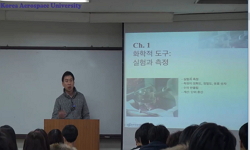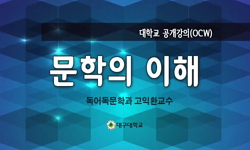이 연구에서는 고등학교 학생들이 이온 결합에 대해 생성한 비유의 특징을 비유 생성 개수와 대응 관계 이해도, 비유의 소재와 유형의 측면에서 분석하고, 이 결과를 학생들의 개념 이해도...
http://chineseinput.net/에서 pinyin(병음)방식으로 중국어를 변환할 수 있습니다.
변환된 중국어를 복사하여 사용하시면 됩니다.
- 中文 을 입력하시려면 zhongwen을 입력하시고 space를누르시면됩니다.
- 北京 을 입력하시려면 beijing을 입력하시고 space를 누르시면 됩니다.

고등학생이 이온 결합에 대해 생성한 비유의 특징 분석 -학생의 인지적 특성에 따른 비유의 특징 비교- = An Investigation of the Characteristics of Analogs Generated by High School Students on Ionic Bonding: A Comparison of Characteristics of Analogs Depending on Their Cognitive Variables
한글로보기https://www.riss.kr/link?id=A102956828
- 저자
- 발행기관
- 학술지명
- 권호사항
-
발행연도
2017
-
작성언어
Korean
-
주제어
비유 생성 활동 ; 비유 ; 이온 결합 ; 인지적 특성 ; Self-generated analogy ; Analogy ; Ionic bonding ; Cognitive variables
-
KDC
374.4
-
등재정보
KCI등재
-
자료형태
학술저널
- 발행기관 URL
-
수록면
39-48(10쪽)
-
KCI 피인용횟수
5
- DOI식별코드
- 제공처
- 소장기관
-
0
상세조회 -
0
다운로드
부가정보
국문 초록 (Abstract)
이 연구에서는 고등학교 학생들이 이온 결합에 대해 생성한 비유의 특징을 비유 생성 개수와 대응 관계 이해도, 비유의 소재와 유형의 측면에서 분석하고, 이 결과를 학생들의 개념 이해도와 논리적 사고력, 비유 추론 능력에 따라 비교하였다. 서울특별시에 소재한 5개 고등학교에 재학 중인 2학년 학생 395명이 연구에 참여하였다. 연구 결과, 개념 이해도, 논리적 사고력, 비유 추론 능력이 높을수록 학생들은 비유를 더 많이 생성하는 것으로 나타났다. 생성한 비유에 대한 대응 관계 이해도는 논리적 사고력과 비유 추론 능력만 관계가 있었다. 학생들이 비유를 생성하기 위해 활용하는 소재는 조사한 인지적 특성 중 목표 개념에 대한 이해도에 따라서만 다르게 나타났다. 또한, 개념 이해도가 높을수록 다양한 소재를 활용하여 비유를 생성하였다. 학생들이 생성한 비유의 유형은 일부 인지적 특성과 관련이 있었다. 예를 들어, 개념 이해도와 논리적 사고력이 높은 학생들이 글과 그림을 모두 사용한 비유를 더 많이 생성하였다. 작위성과 추상도, 체계성의 측면에서 비유의 유형은 인지적 특성과 관련이 없었다. 이상의 결과를 바탕으로 교육적 함의를 논의하였다.
다국어 초록 (Multilingual Abstract)
In this study, we investigated the characteristics of analogs generated by high school students to explain ionic bonding in the perspectives of the number of analogs, the understanding of mapping, and the source and type of analogs. We also compared t...
In this study, we investigated the characteristics of analogs generated by high school students to explain ionic bonding in the perspectives of the number of analogs, the understanding of mapping, and the source and type of analogs. We also compared the results by students` conceptual understanding, logical thinking ability, and analogical reasoning ability. Participants in this study were 395 11th graders in Seoul. The results of the study showed that the higher the conceptual understanding, the logical thinking ability, and the analogical reasoning ability, the more the students generated the analogs. The understanding of mapping was related to logical thinking ability and analogical reasoning ability. It is noteworthy that the sources of analogs differed only depending on their conceptual understanding of the target concept among the cognitive variables studied. Students who had higher conceptual understanding also generated analogs from more diverse sources. Some types of the generated analogs were related to the cognitive variables. For examples, the students who had higher conceptual understanding and logical thinking ability generated more verbal/pictorial analogs. The types of analogs were not related to cognitive variables in terms of artificiality, abstraction, and systemicity. Educational implications of these findings were discussed.
참고문헌 (Reference)
1 변춘수, "학생 중심 비유 활용 수업이 중학생의 광합성 개념 이해에 미치는 영향" 한국과학교육학회 30 (30): 304-322, 2010
2 강훈식, "포화 용액 개념에 대해 초등학교 교사와 일반 학생 및 과학영재 학생들이 만든 비유의 특성 비교" 한국초등과학교육학회 30 (30): 305-314, 2011
3 노태희, "포화 용액 개념에 대해 초등 과학 영재와 일반 학생들이 만든 비유의 특성과 대응 관계 이해도 및 대응 오류" 한국초등과학교육학회 28 (28): 292-303, 2009
4 김유정, "크로마토그래피 개념에 대해 중학교 과학영재가 만든 비유의 유형과 대응 오류 및 비유 만들기 활동에 대한 인식 조사" 한국과학교육학회 29 (29): 861-873, 2009
5 강훈식, "초등학생의 학습접근양식에 따른 비유 만들기 특성, 대응 관계 이해도, 대응 오류, 비유 만들기에 대한 인식" 한국과학교육학회 30 (30): 668-680, 2010
6 최선영, "초등과학 학습에서의 창의력 향상을 위한 시각적비유학습의 효과" 한국과학교육학회 26 (26): 167-176, 2006
7 노태희, "중학교 과학 개념 학습에서 비유 만들기를 이용한 수업이 학생들의 개념 이해에 미치는 효과" 대한화학회 50 (50): 338-345, 2006
8 김동렬, "유전 관련 개념에 대한 고등학생들의 비유 만들기 수업의 적용 효과" 한국과학교육학회 28 (28): 424-437, 2008
9 노태희, "비유 만들기를 활용한 반응속도 개념 학습에서 학생들이 만든 비유의 유형과 대응 관계 이해도 및 대응 오류 조사" 대한화학회 52 (52): 412-422, 2008
10 권혁순, "물질의 세가지 상태에 대하여 중학생들이 만든 비유의 분석" 대한화학회 47 (47): 265-272, 2003
1 변춘수, "학생 중심 비유 활용 수업이 중학생의 광합성 개념 이해에 미치는 영향" 한국과학교육학회 30 (30): 304-322, 2010
2 강훈식, "포화 용액 개념에 대해 초등학교 교사와 일반 학생 및 과학영재 학생들이 만든 비유의 특성 비교" 한국초등과학교육학회 30 (30): 305-314, 2011
3 노태희, "포화 용액 개념에 대해 초등 과학 영재와 일반 학생들이 만든 비유의 특성과 대응 관계 이해도 및 대응 오류" 한국초등과학교육학회 28 (28): 292-303, 2009
4 김유정, "크로마토그래피 개념에 대해 중학교 과학영재가 만든 비유의 유형과 대응 오류 및 비유 만들기 활동에 대한 인식 조사" 한국과학교육학회 29 (29): 861-873, 2009
5 강훈식, "초등학생의 학습접근양식에 따른 비유 만들기 특성, 대응 관계 이해도, 대응 오류, 비유 만들기에 대한 인식" 한국과학교육학회 30 (30): 668-680, 2010
6 최선영, "초등과학 학습에서의 창의력 향상을 위한 시각적비유학습의 효과" 한국과학교육학회 26 (26): 167-176, 2006
7 노태희, "중학교 과학 개념 학습에서 비유 만들기를 이용한 수업이 학생들의 개념 이해에 미치는 효과" 대한화학회 50 (50): 338-345, 2006
8 김동렬, "유전 관련 개념에 대한 고등학생들의 비유 만들기 수업의 적용 효과" 한국과학교육학회 28 (28): 424-437, 2008
9 노태희, "비유 만들기를 활용한 반응속도 개념 학습에서 학생들이 만든 비유의 유형과 대응 관계 이해도 및 대응 오류 조사" 대한화학회 52 (52): 412-422, 2008
10 권혁순, "물질의 세가지 상태에 대하여 중학생들이 만든 비유의 분석" 대한화학회 47 (47): 265-272, 2003
11 Lancor, R. A., "Using student-generated analogies to investigate conceptions of energy : A multidisciplinary study" 36 (36): 1-23, 2014
12 Mayo, J. A., "Using analogies to teach conceptual applications of developmental theories" 14 (14): 187-213, 2001
13 James, M. C., "Using analogies to improve the teaching performance of preservice teachers" 44 (44): 565-585, 2007
14 Wong, E. D., "Understanding the generative capacity of analogies as a tool for explanation" 30 (30): 1259-1272, 1993
15 Spier‐Dance, L., "The role of student‐generated analogies in promoting conceptual understanding for undergraduate chemistry students" 23 (23): 163-178, 2005
16 Coll, R. K., "The role of models/and analogies in science education : Implications from research" 27 (27): 183-198, 2005
17 Noh, T., "The effect of an instruction using analog systematically in middle school science class" 17 (17): 323-332, 1997
18 Roadrangka, V., "The construction of a group assessment of logical thinking (GALT)" 5-8, 1983
19 Zook, K. B., "Systematic analysis of variables that contribute to the formation of analogical misconceptions" 86 (86): 589-600, 1994
20 Kim, Y., "Students’ understanding about the analogies for physics concepts used in korean middle school science textbooks" 20 (20): 411-420, 2000
21 Mozzer, N. B., "Students’ pre-and post-teaching analogical reasoning when they draw their analogies" 34 (34): 429-458, 2012
22 Middleton, J. L., "Student-generated analogies in biology" 53 (53): 42-46, 1991
23 Pittman, K. M., "Student-generated analogies : another way of knowing?" 36 (36): 1-22, 1999
24 Fogwill, S., "Student co-generated analogies and their influence on the development of science understanding" University of Technology Sydney 2010
25 Wong, E. D., "Self-generated analogies as a tool for constructing and evaluating explanations of scientific phenomena" 30 (30): 367-380, 1993
26 Mozzer, N. B., "Science teachers’ analogical reasoning" 43 (43): 1689-1713, 2013
27 Duit, R., "On the role of analogies and metaphors in learning science" 75 (75): 649-672, 1991
28 Fensham, P., "New movements in the study and teaching of chemistry" Temple Smith 199-217, 1975
29 BouJaoude, S., "Middle school students’ perceptions of the instructional value of analogies, summaries and answering questions in life science" 17 (17): 72-78, 2008
30 Cornelius-White, J., "Learner-centered teacher-student relationships are effective : A meta-analysis" 77 (77): 113-143, 2007
31 Bellocchi, A., "Investigating and theorizing discourse during analogy writing in chemistry" 48 (48): 771-792, 2011
32 Blanchette, I., "How analogies are generated : The roles of structural and superficial similarity" 28 (28): 108-124, 2000
33 Zook, K. B., "Effects of analogical processes on learning and misrepresentation" 3 (3): 41-72, 1991
34 Haglund, J., "Collaborative and self-generated analogies in science education" 49 (49): 35-68, 2013
35 Lemke, J. L., "Articulating communities : Sociocultural perspectives on science education" 38 (38): 296-316, 2001
36 Dagher, Z. R., "Analysis of analogies used by science teachers" 32 (32): 259-270, 1995
37 Thiele, R. B., "An interpretive examination of high school chemistry teachers’ analogical explanations" 31 (31): 227-242, 1994
38 Harrison, A. G., "A typology of school science models" 22 (22): 1011-1026, 2000
39 Noh, T., "A study on science teachers’ practices and perceptions of using analogies" 19 (19): 665-673, 1999
40 Hu, W., "A scientific creativity test for secondary school students" 24 (24): 389-403, 2002
41 Nottis, K. E. K., "A comparative analysis of pre-service teacher analogies generated for process and structure concepts" 5 (5): 2001
동일학술지(권/호) 다른 논문
-
우리나라 중학교 2학년 학생들의 과학에 대한 정의적 태도 특성 탐색
- 한국과학교육학회
- 곽영순 ( Youngsun Kwak )
- 2017
- KCI등재
-
과학 탐구와 과학 교수학습에서의 모델과 모델링에 대한 교사들의 인식
- 한국과학교육학회
- 강남화 ( Nam-hwa Kang )
- 2017
- KCI등재
-
모형 구성 과정에서 나타나는 초등학생의 인지, 감정적 반박 -인식적 감정을 중심으로-
- 한국과학교육학회
- 한문현 ( Moonhyun Han )
- 2017
- KCI등재
-
과학교육을 위한 전략적 실행공동체의 형성 가능성 탐색 -과학중점학교를 중심으로-
- 한국과학교육학회
- 김진희 ( Jinhee Kim )
- 2017
- KCI등재
분석정보
인용정보 인용지수 설명보기
학술지 이력
| 연월일 | 이력구분 | 이력상세 | 등재구분 |
|---|---|---|---|
| 2027 | 평가예정 | 재인증평가 신청대상 (재인증) | |
| 2021-01-01 | 평가 | 등재학술지 유지 (재인증) |  |
| 2018-03-29 | 학술지명변경 | 외국어명 : Journal of the Korean Association for in Science Education -> Journal of the Korean Association for Science Education |  |
| 2018-01-01 | 평가 | 등재학술지 유지 (등재유지) |  |
| 2015-01-01 | 평가 | 등재학술지 유지 (등재유지) |  |
| 2011-01-01 | 평가 | 등재학술지 유지 (등재유지) |  |
| 2009-01-01 | 평가 | 등재학술지 유지 (등재유지) |  |
| 2007-04-26 | 학술지명변경 | 외국어명 : Journal of the Korean Association for Research in Science Education -> Journal of the Korean Association for in Science Education |  |
| 2007-04-03 | 학회명변경 | 영문명 : The Korean Association For Research In Science Education -> The Korean Association for Science Education |  |
| 2007-01-01 | 평가 | 등재학술지 유지 (등재유지) |  |
| 2005-01-01 | 평가 | 등재학술지 유지 (등재유지) |  |
| 2002-01-01 | 평가 | 등재학술지 선정 (등재후보2차) |  |
| 1999-07-01 | 평가 | 등재후보학술지 선정 (신규평가) |  |
학술지 인용정보
| 기준연도 | WOS-KCI 통합IF(2년) | KCIF(2년) | KCIF(3년) |
|---|---|---|---|
| 2016 | 1.87 | 1.87 | 1.69 |
| KCIF(4년) | KCIF(5년) | 중심성지수(3년) | 즉시성지수 |
| 1.66 | 1.54 | 2.133 | 0.47 |





 ScienceON
ScienceON KISS
KISS







